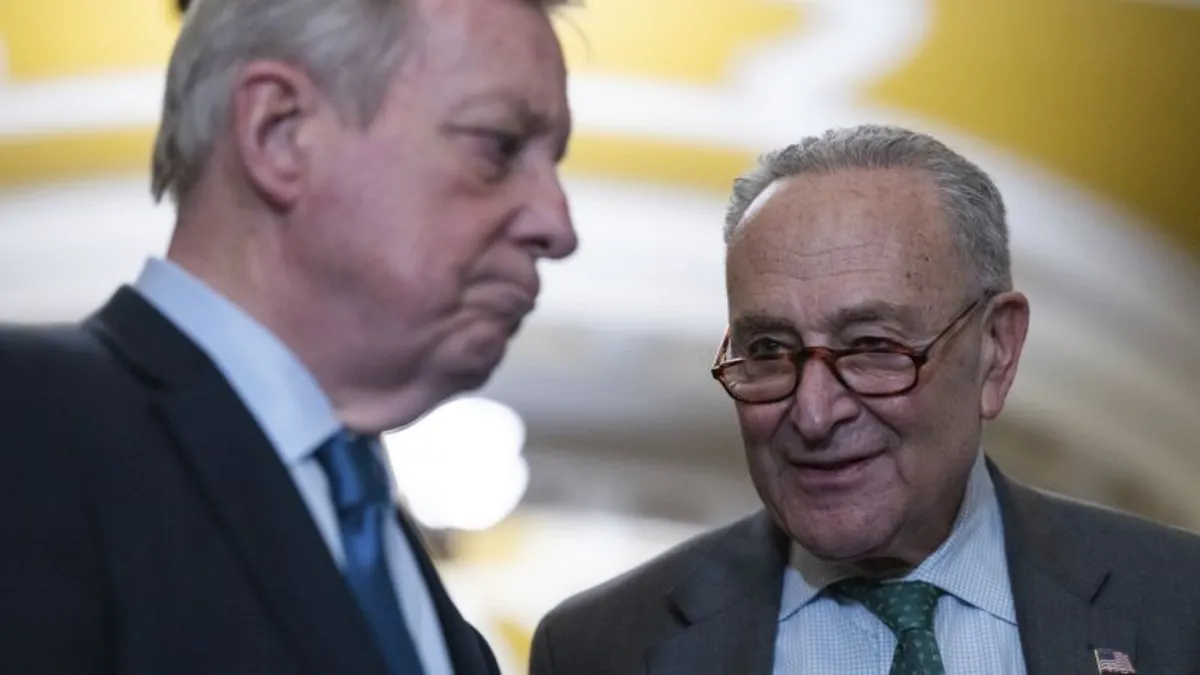
As President Donald Trump marks his first 100 days in office, congressional Democrats face a significant challenge: not only his aggressive approach to governance but also a rising concern that their base voters feel insufficiently represented in the fight against his policies. In response, Democrats have organized a series of impactful speeches, sit-ins, and events aimed at showcasing their commitment to opposing the administration’s controversial actions.
On Tuesday, as Trump holds rallies to celebrate his 100 days, Democrats plan to keep the Senate floor open late into the evening, where they will deliver speeches criticizing what Senate Minority Leader Chuck Schumer has labeled “100 days of hell.” This effort will culminate in a demonstration on the Senate steps alongside House Democrats, who will vocally oppose Trump's agenda. Schumer stated, “Day after day after day, we will hammer home the Republican agenda, and Americans will see the difference between Democratic unity and Republican disarray.” He emphasized that as long as Trump continues to push the nation down a perilous path, he will encounter resistance from Democrats, the courts, and importantly, the American populace.
Democrats nationwide are feeling the heat from voters who are dissatisfied with the perceived lack of opposition to Trump's administration. With Republicans controlling the White House, the House of Representatives, and the Senate, Democrats are struggling to find effective ways to counter the administration’s policies. Senate Minority Whip Dick Durbin acknowledged the atmosphere of impatience and frustration among their supporters, stating, “There’s a tremendous amount of energy, there’s a tremendous amount of impatience, and there’s tremendous frustration.” He urged supporters to understand that while they have limited options, they are committed to doing their utmost to resist the current administration.
In a significant development, Durbin announced last week that he will not seek reelection, stepping down from his influential position in Senate Democratic leadership after two decades. The new leader will play a crucial role in shaping the party's policies and messaging as they navigate the second half of Trump's term. Hawaii Senator Brian Schatz has confirmed discussions with other senators about running for this pivotal role, while Senators Cory Booker and Elizabeth Warren have expressed they are not interested in the position. Warren, however, voiced her belief that all elected Democrats need to intensify their efforts against Trump, stating, “We need every single Democratic senator and representative 100% in the fight every single day.”
In light of the ongoing challenges, Senator Amy Klobuchar emphasized the importance of focusing on policies that can move the country forward, particularly in addressing the chaos created by Trump. Booker, looking to energize the party, recently delivered an extensive speech on the Senate floor against the Trump administration and participated in a sit-in alongside House Democratic Leader Hakeem Jeffries, warning about potential cuts to vital social programs like Social Security, Medicare, and Medicaid. He stressed the need for Democrats to explore “creative new things” to effectively convey their message and engage the public.
As Democrats return to Washington, they face criticism that their messaging is inadequate and lacks the necessary vigor to combat Trump’s agenda. At a recent town hall, Representative Marie Gluesenkamp Perez addressed concerns about the party's perceived lack of anger and fight, suggesting that while being loud may feel satisfying, it might not be a sustainable long-term strategy. Meanwhile, Jeffries advocates for a more aggressive approach, asserting that “more is more” when it comes to acts of resistance, proposing rallies, town hall meetings, and days of action to amplify their message.
The tactics employed by Democrats have not gone unnoticed by their Republican counterparts. GOP Senator John Cornyn of Texas remarked that the Democrats’ actions seem to be more about appeasing an angry base rather than presenting focused demands. He criticized the party for their inability to convince the public of their effectiveness and pointed out that their ultimate goal of reversing the election results is unrealistic.
As the political landscape evolves, the coming weeks will be crucial for Democrats as they strive to align their strategies with the expectations of their constituents while navigating the challenges posed by the Trump administration.